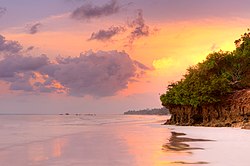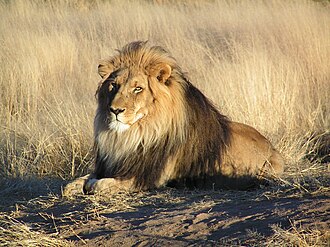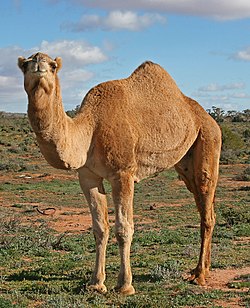Portal:Africa



Africa is the world's second-largest and second-most populous continent after Asia. At about 30.3 million km2 (11.7 million square miles) including adjacent islands, it covers 20% of Earth's land area and 6% of its total surface area. With nearly 1.4 billion people as of 2021, it accounts for about 18% of the world's human population. Africa's population is the youngest among all the continents; the median age in 2012 was 19.7, when the worldwide median age was 30.4. Based on 2024 projections, Africa's population will exceed 3.8 billion people by 2100. Africa is the least wealthy inhabited continent per capita and second-least wealthy by total wealth, ahead of Oceania. Scholars have attributed this to different factors including geography, climate, corruption, colonialism, the Cold War, and neocolonialism. Despite this low concentration of wealth, recent economic expansion and a large and young population make Africa an important economic market in the broader global context, and Africa has a large quantity of natural resources.
Africa is highly biodiverse; it is the continent with the largest number of megafauna species, as it was least affected by the extinction of the Pleistocene megafauna. However, Africa is also heavily affected by a wide range of environmental issues, including desertification, deforestation, water scarcity, and pollution. These entrenched environmental concerns are expected to worsen as climate change impacts Africa. The UN Intergovernmental Panel on Climate Change has identified Africa as the continent most vulnerable to climate change.
The history of Africa is long, complex, and varied, and has often been under-appreciated by the global historical community. In African societies the oral word is revered, and they have generally recorded their history via oral tradition, which has led anthropologists to term them "oral civilisations", contrasted with "literate civilisations" which pride the written word. African culture is rich and diverse both within and between the continent's regions, encompassing art, cuisine, music and dance, religion, and dress.
Africa, particularly Eastern Africa, is widely accepted to be the place of origin of humans and the Hominidae clade, also known as the great apes. The earliest hominids and their ancestors have been dated to around 7 million years ago, and Homo sapiens (modern human) are believed to have originated in Africa 350,000 to 260,000 years ago. In the 4th and 3rd millennia BCE Ancient Egypt, Kerma, Punt, and the Tichitt Tradition emerged in North, East and West Africa, while from 3000 BCE to 500 CE the Bantu expansion swept from modern-day Cameroon through Central, East, and Southern Africa, displacing or absorbing groups such as the Khoisan and Pygmies. Some African empires include Wagadu, Mali, Songhai, Sokoto, Ife, Benin, Asante, the Fatimids, Almoravids, Almohads, Ayyubids, Mamluks, Kongo, Mwene Muji, Luba, Lunda, Kitara, Aksum, Ethiopia, Adal, Ajuran, Kilwa, Sakalava, Imerina, Maravi, Mutapa, Rozvi, Mthwakazi, and Zulu. Despite the predominance of states, many societies were heterarchical and stateless. Slave trades created various diasporas, especially in the Americas. From the late 19th century to early 20th century, driven by the Second Industrial Revolution, most of Africa was rapidly conquered and colonised by European nations, save for Ethiopia and Liberia. European rule had significant impacts on Africa's societies, and colonies were maintained for the purpose of economic exploitation and extraction of natural resources. Most present states emerged from a process of decolonisation following World War II, and established the Organisation of African Unity in 1963, the predecessor to the African Union. The nascent countries decided to keep their colonial borders, with traditional power structures used in governance to varying degrees. (Full article...)
Selected article –
Diani Beach is a beach on the Indian Ocean coast of Kenya. It is located 30 kilometres (19 mi) south of Mombasa, in Kwale County. (Full article...)
Featured pictures –
Did you know (auto-generated) -

- ... that Central City College was established as an African American-led alternative to the historically black Atlanta Baptist College?
- ... that Erick Russell is the first openly gay African American elected to a statewide office in the United States?
- ... that on February 3, 1986, African Independence Party leaders Adama Touré and Adama Touré were released from detention?
- ... that the Octavius V. Catto Memorial, unveiled in 2017, contains the first statue on Philadelphia public property of a specific African American?
- ... that Saint Augustine died during the Vandal conquest of Roman Africa?
- ... that Their Highest Potential shows the positive side of segregated schools, as written by a student who was taught in one?
Categories
Selected biography –

Lusius Quietus (Latin: Lusius Quiētus, pronounced [ˈɫʊ.si.ʊs kᶣiˈeː.tʊs]; Koinē Greek: Λούσιος Κυήτος, romanized: Loúsios Kyítos, pronounced [ˈlu.si.os kyˈi.tos]) was a Roman Berber general and 11th legate of Judaea from 117. He was the principal commander against the Jewish rebellion known as the Kitos War (Kitos is a later corruption of Quietus). He was notably one of the most important Berber statesmen in ancient Roman history. After the death of the emperor Trajan, Quietus was murdered or executed, possibly on the orders of Trajan's successor Hadrian. (Full article...)
Selected country –
 |
 |
||

| |||
Eritrea (Ge'ez: ኤርትራ ʾĒrtrā) is a country situated in northern East Africa. It is a multilingual and multicultural country with two dominant religions (Sunni Islam and Oriental Orthodox Christianity) and nine ethnic groups. It is bordered by Sudan in the west, Ethiopia in the south, and Djibouti in the southeast. The east and northeast of the country have an extensive coastline on the Red Sea, directly across from Saudi Arabia and Yemen. The Dahlak Archipelago and several of the Hanish Islands are part of Eritrea.
Eritrea was consolidated into a colony by the Italian government on January 1, 1890. Upon Italy's losses in World War II, Eritrea was ruled as a British protectorate between 1941 and 1952. Following a UN plebiscite in 1950, a resolution 390 (V) was adopted to have Eritrea enter into a federation with Ethiopia in 1952. Emperor Haile Selassie I nevertheless annexed Eritrea as Ethiopia's 14th province in 1961 sparking the 30-year Eritrean War of Independence. Following a UN-supervised referendum, Eritrea declared and gained international recognition for its independence in 1993. (Read more...)
Selected city –
Laghouat (Arabic: الأغواط, romanized: al-Aghwāṭ) is the capital of the Laghouat Province, Algeria, 400 km (250 mi) south of the Algerian capital Algiers. Located in the Amour Range of the Saharan Atlas, the town is an oasis on the north edge of the Sahara Desert. It is an important administrative and military center and marketplace, and is known for rug and tapestry weaving.
Laghouat traces its history to at least the 11th century. It was ruled by the Ottoman Turks in 1786 and annexed to Beylik of Titteri (Médéa). The town experienced the brutal Siege of Laghouat in 1852, and came under French colonial rule until 1962. (Full article...)
In the news
- 18 April 2025 –
- The death toll of the fire and capsizing of the wooden boat HB Kongolo on the Congo River in Democratic Republic of the Congo, Central Africa, three days ago rises to 148. Hundreds of others remain missing. (Reuters)
- 17 April 2025 – Somali Civil War
- 2025 Shabelle offensive, American military intervention in Somalia
- U.S. airstrikes kill twelve al-Shabaab insurgents in central Somalia, while a separate airstrike destroys an unflagged vessel suspected of carrying weapons for the militant group off the Somali coast. (Reuters) (Middle East Monitor)
- 16 April 2025 – Somali Civil War
- Al-Shabaab militants capture the Adan Yabal District in Middle Shabelle, Somalia, as the group continues to advance towards the capital Mogadishu. (Reuters)
- 16 April 2025 –
- The HB Kongolo traveling from Matankumu to Bolomba, carrying around 400 people, catches fire and capsizes on the Congo River near Mbandaka, Democratic Republic of the Congo, killing at least 50 people and leaving hundreds more missing. (AP)
- 16 April 2025 – Sudanese civil war
- The leader of the Sudanese Rapid Support Forces, Mohamed Hamdan Dagalo, announces the establishment of the Government of Peace and Unity, a rival government to the country's armed forces. (BBC News)
Updated: 23:05, 18 April 2025
General images -
Africa topics
More did you know –
- ... that at approximately 5,000 years old, the Lothagam North Pillar Site is thought to be the earliest and largest monumental cemetery in eastern Africa?
- ... that a 2020 study found that African countries which allowed foreign funding of NGOs had a higher voter turnout?
- ... that Essop Moosa, who was of Indian origin, became the first non-white player to play for an all-white soccer team in South Africa, appearing under a pseudonym?
- ... that the Seventh German Inner Africa Research Expedition served as cover for a secret First World War espionage mission?
Related portals
Major Religions in Africa
North Africa
West Africa
Central Africa
East Africa
Southern Africa
Associated Wikimedia
The following Wikimedia Foundation sister projects provide more on this subject:
-
Commons
Free media repository -
Wikibooks
Free textbooks and manuals -
Wikidata
Free knowledge base -
Wikinews
Free-content news -
Wikiquote
Collection of quotations -
Wikisource
Free-content library -
Wikispecies
Directory of species -
Wikiversity
Free learning tools -
Wikivoyage
Free travel guide -
Wiktionary
Dictionary and thesaurus



























































































